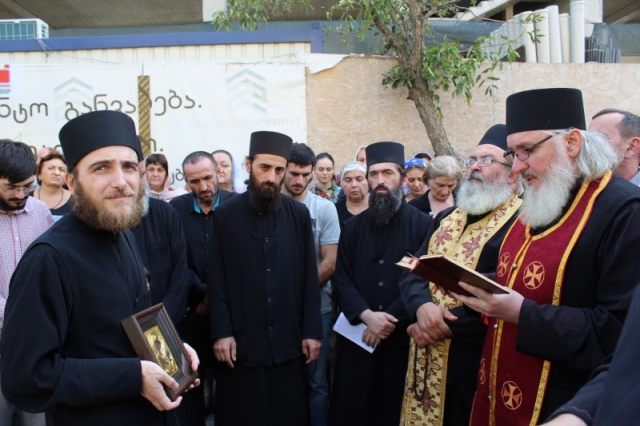 TBILISI – A group of Georgian Orthodox ultranationalists and priests held a rally Wednesday afternoon outside the Vatican Embassy in Tbilisi to protest the upcoming visit of Pope Francis.
TBILISI – A group of Georgian Orthodox ultranationalists and priests held a rally Wednesday afternoon outside the Vatican Embassy in Tbilisi to protest the upcoming visit of Pope Francis.
The group claimed the papal visit is an affront to the purity of the Georgian Orthodox and an insult to the Georgian people as the Holy See is anathema to the beliefs of Orthodox Christianity.
One of the organizers of the rally, Avtandil Ungiadze, claimed the protesters were there to “preserve the reputation of the true church”, and vowed to bar Pope Francis from entering the 11th century Svetitskhoveli Cathedral in nearby Mtskheta.
The cathedral, whose name translates in English as “the Cathedral of the Living Pillar”, is considered the Georgian Orthodox Church’s most venerated place of worship. Orthodox believers claim the church houses Christ’s Mantle – the tunic reportedly worn by Christ at the time of his crucifixion.
The organizers of the rally claim that the Pope’s visit to the cathedral and Mtskheta – the site of Georgia’s 4thcentury conversion to Christianity – amounts to “a spiritual aggression by the Vatican and an attempt by the Catholic Church to colonize Georgia.”
Pope Francis plans to attend a mass at the Cathedral and meet with the head of the Georgian Orthodox Church, Patriarch Ilia II, during his three-day visit to the small South Caucasus nation that begins September 30.
The protestors believe a papal visit to the birthplace of Georgian Orthodoxy amounts to an attempt by the Vatican to proselytize to Georgia’s estimated 3 million Eastern Orthodox believers.
Holding signs reading, “Pope Arch-heretic. You are not welcome in Georgia” and “Stay far away from Georgia Antichrist,” Ungiadze and other protestors refused to comment of whether the rally had been sanctioned by the Georgian Patriarchate.
Local news outlet Netgazeti later reported that the Patriarchate has denied any involvement with the protestors, but refused to reprimand the priests who attended the rally.
The rally was the latest in a series of provocative acts that brought together ultranationalists and members of the Georgian Orthodox Church. In 2013, the two took part in a violent crackdown on a Gay Pride rally in Tbilisi that left dozens severely injured.
In May, Georgian nationalists led by the eccentric Levan Vasadze – whom news platform Coda Story described as “a dagger-sporting homophobic knight dressed in Georgian national attire” – members of the Georgian church and far-right Christian extremists from Russia and the US gathered in Tbilisi for the World Congress of Families.
The gathering echoed calls by Russia’s powerful Patriarch Kirill, who has claimed women’s and LBGT rights are “antithetical to Orthodox beliefs and traditional family values”.
Georgia’s Orthodox Church has fostered close ties with the Moscow Patriarchate over the last decade. Earlier this year, it joined Russia and Serbia in boycotting a Holy Synod – the first in more than 1,000 years – called by the Patriarchate of Constantinople, as the three churches objected to several modest modernization initiatives that were to be discussed by the various churches that make up Eastern Orthodoxy.
The Western and Eastern branches of Christianity formally split into two competing branches in 1054 over political and theological differences.
The ecclesiastical differences and theological disputes between the Greek East and Latin West pre-dated the formal rupture that occurred in the mid-11th century. Chief among these were issues concerning the concept of the Holy Spirit, whether to use unleavened bread in the Eucharist, Rome’s claim to universal jurisdiction over the Christian world and the authority of the Patriarch of Constantinople.
The main doctrinal split can be found in Roman Catholicism’s (and later Protestantism) belief in the equal duality of Christ’s divine and human nature, while Orthodoxy mainly focuses on Christ’s mystic divinity in the form of a man.
Relations between the two branches have been fraught over the centuries, though a rapprochement has been on-going since Constantinople Patriarch Bartolomew and former Pope John Paul II first met in the early 2000s.
Despite claims by the protestors outside the Vatican Embassy that Georgia is a strictly Orthodox nation, recent statistics say Orthodox Christians make up 86 per cent of Georgia’s population, while Roman Catholics – who have been in Georgia since the 14th century – make up only 1 per cent.
The country’s second largest religious group, Muslims, account for roughly 13 per cent of the overall population.
Georgia’s 2,500-year-old Jewish population has dwindled in the last 20 years due to high levels of emigration to Israel.